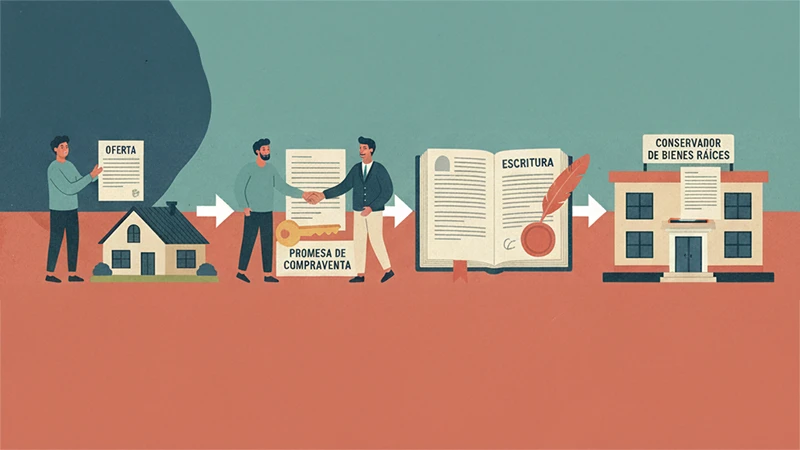The process of buying a property in Chile includes several formal and recommended steps. At each step it is essential to ensure that the property complies with the agreed conditions and that the legal requirements for transferring the property are met. In the deeds of sale in Chile it is usually stipulated that the buyer receives the property “in the state it is currently in, with everything built and planted on it, which he declares to know and accept”. Therefore, it is recommended to visit the property several times and verify its physical and documentary or legal conditions. It is necessary to verify that the surface and boundaries coincide with the title deed registered in the Real Estate Registry. If the buyer discovers hidden defects (serious defects prior to the sale that were not evident), he has the right, according to the Civil Code (arts. 1857-1860), to demand the rescission of the contract or a proportional reduction of the price. To avoid later surprises, it is advisable to give notice of any defects to the seller before signing the contract of sale, and to state the condition of the property in the contract.
Offer the reservation letter
As a preliminary step, the buyer may send the seller an offer or reservation letter, which specifies the basic terms of the negotiation: proposed price, response time, payment terms, and obligation to sign a promise of sale and/or the final deed. Although this offer is not mandatory by law, it is usually recommended because it formalizes the initial intentions of both parties. In this way, the minimum conditions agreed upon (price, terms, associated expenses, etc.) are recorded before moving forward with the contract.
Promissory purchase agreement
Once the offer is accepted, it is customary to sign a promise of sale (preliminary contract). In Chile there is no legal obligation to sign it, but it is strongly recommended to give seriousness and security to the business. The promise of sale is a written commitment to the future: it establishes the definitive price, the essential conditions of the property (ownership history, condition, payment terms, etc.), and typically includes penalty clauses if either party fails to comply. It must be in writing and set a deadline or condition for the execution of the final deed. In practice, it is required to stipulate all the key elements of the future sale and purchase, so that only the signing of the public deed and the registration in the Registry is required to transfer the property. Although the promise can be granted in a private document, it is often signed before a notary so that it has a date certain and it is easier to enforce it judicially in case of conflict.
Public deed of sale
The public deed of sale is the definitive contract executed before a notary public, which contains all the legal and formal antecedents. It must clearly describe the property (address, role, measurements) and agree on the sale price. In Chile it is customary to fix the value in Unidades de Fomento (UF), rounded to Chilean pesos on the day of signing. The essential elements of the sale are the price and the property sold; therefore, the buyer and seller assume opposite obligations: the buyer must pay the agreed price and the seller must deliver the domain and the material possession of the property to the buyer. The formal delivery is made by registering the deed in the corresponding Real Estate Registry. The deed usually includes a notarial instructions clause, in which the buyer and seller instruct the notary to keep the payment documents (promissory note, demand voucher, check or time deposit) until the sale is registered in the name of the buyer in the CBR. This protects the buyer from paying before legally acquiring ownership. For companies or persons acting with power of attorney, an authorized copy of the valid powers of attorney must be attached, so that the notary can verify the legal capacity of the signatories.
Registration with the Real Estate Registry
The signing of the deed does not automatically transfer ownership: under the Chilean legal system the acquisition of real estate requires a “title” plus a “mode”. The deed (title) and its subsequent registration in the Real Estate Registry (mode) are both necessary. As the Real Estate Registry points out, “after the deed of sale of a property is signed, it is registered in the Real Estate Registry”. Only after this registration the buyer is legally the owner of the property. For this reason, it is essential to take the signed deed to the competent Land Registry (the one of the commune where the property is located) so that the transfer can be registered.
Final recommendations and title study
It is highly recommended to have a lawyer specialized in real estate law during the whole process. A professional can review each document and guide the negotiation. In particular, a title search of the property should be conducted before signing any promise. This study involves a detailed analysis of the property’s registry history -inscriptions, mortgages, encumbrances, prohibitions, easements, etc.- and verification of the chain of ownership going back at least 10 years. The objective is to make sure that there are no legal impediments (such as unpaid mortgages, pending lawsuits or ownership limitations) affecting the property, and to confirm that the seller really has the legal authority to sell. Many complications arise from registry “defects” that can only be detected by a careful study. For this reason, when financing with a mortgage loan, banks require by law their own title search to guarantee their credit.
In summary, the typical process consists of: (1) Visiting and verifying the property; (2) Offering or reserving the purchase with a document that stipulates conditions; (3) Signing a promise of sale (ideally before a notary) to fix price, term and guarantees; (4) Executing the public deed of sale before a notary, detailing price and obligations; (5) Registering the deed in the corresponding Registry, with which the buyer acquires legal ownership. At each step it is useful to have legal and real estate advice to protect the interests of the buyer (whether Chilean or foreign) and ensure that the transaction is carried out in accordance with the law.
At Produncan Lands we understand that buying a property in Chile is an important step that requires security, confidence and expert support at every stage. That is why we support you in every step. Our goal is to give you peace of mind and support, ensuring that your purchase is made safely, informed and without surprises.


